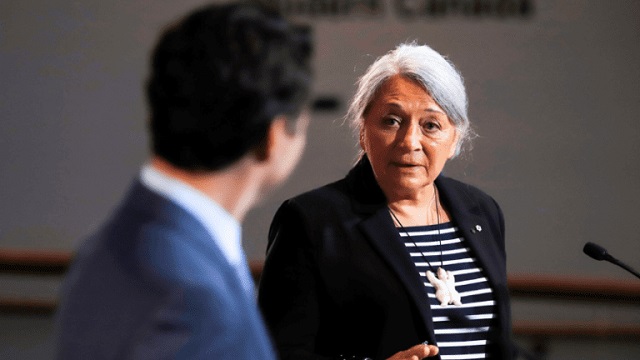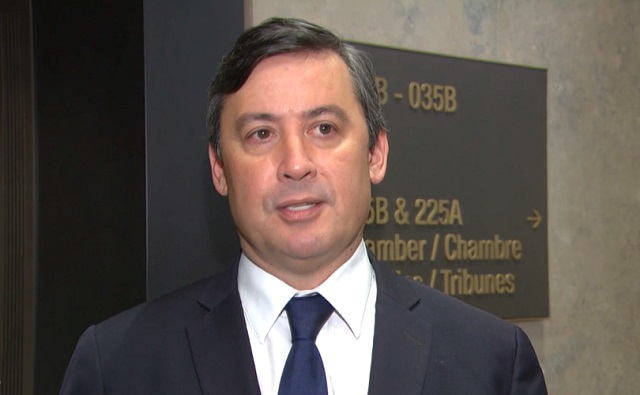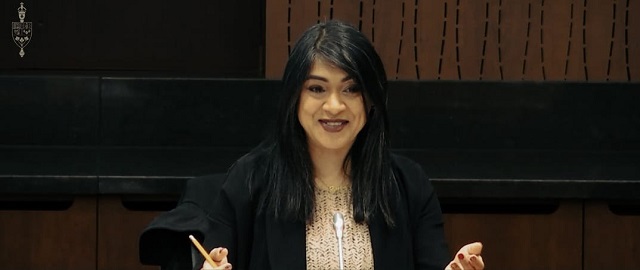Opinion
CAM N EGGS – PART 2 OF 5: My friend Gerry

MacDonald Laurier Institute
The Governor General deserves better, but we deserve impartiality

From the Macdonald Laurier Institute
By Philippe Lagassé
Mary Simon’s impartiality was undermined by hosting a symposium tied to controversial government legislation.
Mary Simon has been a guarded Governor General. She’s adopted a low profile since her appointment, performing her vice-regal responsibilities without much notice. When she has been in the news, it’s usually because of her efforts to learn French and costly diplomatic trips, not on account of an initiative she’s launched or a stance she’s taken. Aside from routine public statements and some championing of Indigenous reconciliation, Simon hasn’t tried to make a mark. Until last week, that is.
On April 11, Her Excellency hosted a symposium on online abuse and creating safe digital spaces. Simon has been the target of vitriol on social media, a reality she shares with many public figures, particularly women. She wants to address this problem, stressing that “we deserve better.” As far as causes go, this is a laudable one. Online abuse is a serious issue, one that can excuse and encourage physical violence and attacks. To highlight the severity of the challenge, the Governor General’s symposium featured well-known Canadians who’ve also suffered from online abuse and are determined to fight it.
Unfortunately, the Governor General’s symposium took place while a government bill on online harms is making its way through Parliament. Bill C-63, the Online Harms Act, has been the source of significant controversy, notably around its impact on free expression and the potential life sentences it imposes on certain types of hateful speech. C-63 has been criticized by law professors, civil liberties advocates, and the Conservative Party. While there may be a general consensus that online abuse is a scourge, the solution is contentious, and Bill C-63 has been the subject of serious debate.
As well-intentioned as the Governor General’s symposium was, she should never have hosted it in this context, a conclusion that’s reinforced by the Minister of Justice publicly tying the event to bill C-63. As soon as the government tabled the bill, Her Excellency should have understood that the symposium was no longer appropriate and would present a risk to her office’s impartiality.
The Governor General is the second highest office of the Canadian state, right under the King. As the King’s vice-regal representative, the Governor General performs core constitutional functions. These demand that the Governor General not only act impartially but be perceived to be impartial. This isn’t just good form, it’s a fundamental part of the job.
As part of their constitutional role, Governors General exercise the Crown’s reserve powers. These include the granting of royal assent to legislation on the advice of the houses of Parliament, proroguing and dissolving Parliament on the advice of the Prime Minister, and inviting a party leader to form a new government when the serving Prime Minister resigns. Impartiality helps shield the Governor General from partisan attacks when exercising these powers and maintains public trust in the office.
Now, to be clear, the Governor General has very limited discretion in exercising these reserve powers. As long as the Prime Minister’s party holds the confidence of the House of Commons, the Governor General must almost always accept their advice. Yet, there have been and will be cases where vice-regal representatives exercise their discretion to decide the fates of governments or guard against unconstitutional abuses of power. When these occur, we need the Governor General to be respected as a non-partisan, politically neutral office. Doubts about a Governor General’s impartiality undermine her or his constitutional functions and can weaken trust in the office when it’s most needed.
Turning back to the symposium, it’s important to clarify why it undermined her impartiality, or at least perceptions of it. Defenders of the symposium have argued that the event didn’t feature any members of the government as speakers, hence it wasn’t partisan or meant to endorse the Online Harms Act. Suffice to say, had ministers spoken at the event, we would be dealing with an outright constitutional debacle, not just concerns about vice-regal impartiality. A full-on violation of constitutional norms isn’t the standard here. Instead, we should be asking why the Minister of Justice was even there, and why the Governor General decided to host the symposium, considering how contentious Bill C-63 has been already. Hosting the event allowed Her Excellency to get pulled into the partisan fray, a predictable outcome that she shouldn’t have risked.
Those who participated in the symposium will counter that it was the Minister of Justice who made the connection with Bill C-63, not the Governor General. Her Excellency’s motives, and the importance of the cause addressed by the symposium, shouldn’t be impugned by a careless, partisan tweet. Alas, partisans are going to partisan and politicians are going to politick. This is precisely why vice-regal representatives should avoid wading into politically charged topics. Expecting politicians to show restraint and respect the neutrality of the office of the Governor General is more than a tad naive. Vice-regal representatives should have the wherewithal to avoid situations where their office can be leveraged for partisan purposes.
Defenders of the symposium offer another argument: as the sovereign’s representative, the Governor General should address important social problems that affect Canadians. The vice-regal role shouldn’t be confined to constitutional functions, ceremonies, and commemorations. Not allowing vice-regal representatives to advocate for the public good would be a lost opportunity. This is a fair point, though Governors General need to be careful about what causes they take up. When it comes to vice-regal advocacy, banal benevolence is the way to go. Anything that’s the subject of notable partisan and parliamentary debate, is ideologically fraught, or might be fought over during an election should raise red flags.
Thankfully for the Governor General, the controversy surrounding her symposium hasn’t extended beyond the Ottawa bubble yet. She should keep it that way by abandoning her “We Deserve Better” campaign while partisans battle it out over Bill C-63 and the courts review the Online Harms Act if it becomes law.
This isn’t because the Governor General doesn’t deserve better; she does, as do all those who suffer online abuse. It’s because Canadians deserve impartiality from the Governor General, both real and perceived.
Philippe Lagassé is an associate professor at Carleton University. He’s the co-editor of Canada and the Crown: Essays on Constitutional Monarchy (2014) and The Crown and Parliament(2015).
Automotive
Biden’s Kill Switch: The Growing Threat of Government Control of Your Car

From StosselTV
The government may soon be able to shut down your car. Biden’s $1.2 trillion infrastructure bill includes a kill switch for new cars.
In an effort to reduce drunk driving, government wants devices in cars that will monitor and limit impaired driving. But there’s a big problem: these devices give government control over your car.
Automotive engineer and former vintage race car driver Lauren Fix points out the dangers in my video.
After 40+ years of reporting, I now understand the importance of limited government and personal freedom.
——————————————
Libertarian journalist John Stossel created Stossel TV to explain liberty and free markets to young people.
Prior to Stossel TV he hosted a show on Fox Business and co-anchored ABC’s primetime newsmagazine show, 20/20.
Stossel’s economic programs have been adapted into teaching kits by a non-profit organization, “Stossel in the Classroom.” High school teachers in American public schools now use the videos to help educate their students on economics and economic freedom. They are seen by more than 12 million students every year.
Stossel has received 19 Emmy Awards and has been honored five times for excellence in consumer reporting by the National Press Club. Other honors include the George Polk Award for Outstanding Local Reporting and the George Foster Peabody Award.
————
To get our new weekly video from Stossel TV, sign up here: https://www.johnstossel.com/#subscribe ————
-

 Bruce Dowbiggin1 day ago
Bruce Dowbiggin1 day agoOJ Trial: How It Launched Cable News And Destroyed MLK’s Legacy
-

 Brownstone Institute2 days ago
Brownstone Institute2 days agoDeborah Birx Gets Her Close-Up
-

 Health1 day ago
Health1 day agoSetback for the Transgender movement: Michael Shellenberger on leaked files revealing medical malpractice on children and vulnerable adults
-

 Alberta1 day ago
Alberta1 day agoBuilding a 21st century transit system for Calgary
-

 Education1 day ago
Education1 day agoSolar eclipse school closures underscore impact of learning loss
-

 Health22 hours ago
Health22 hours agoTime for an intervention – an urgent call to end “gender-affirming” treatments for children
-

 Health21 hours ago
Health21 hours agoQuadriplegic man dies via euthanasia after developing bed sores waiting at Quebec hospital
-

 espionage21 hours ago
espionage21 hours agoConservative MP testifies that foreign agents could effectively elect Canada’s prime minister, premiers







